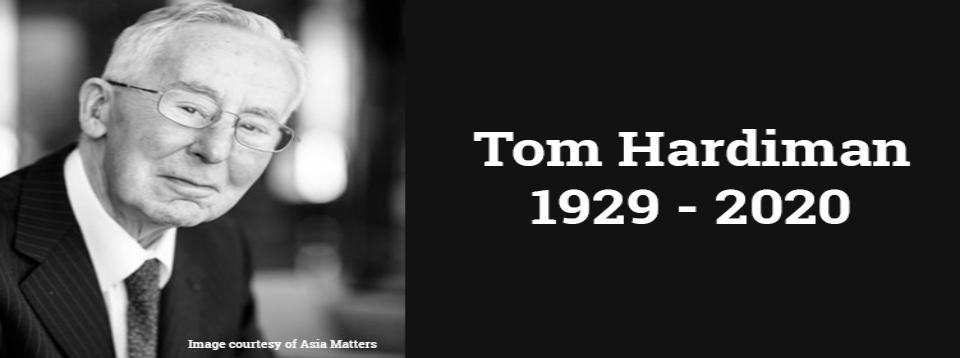Tom Hardiman

Tom Hardiman was born in Phibsborough Dublin on March 16th 1929. Educated in Colaiste Mhuire, he studied engineering and mathematics graduating from UCD in Mechanical and Electrical Engineering in 1952. After a spell in the then Department of Posts and Telegraphs, he joined Radio Éireann Engineering later in the 50s.
He was the engineer in charge at the inaugural Telefis Eireann broadcast from Dublin’s Gresham Hotel on New Year’s Eve 1961. He then moved through the RTÉ ranks to become Director of Engineering in 1963. He was appointed as the third Director General of the organisation in 1968 at the age of 39.
His appointment coincided with the eruption of the Northern Ireland Troubles and growing tension between government and the national broadcaster over its news coverage. Hardiman was sometimes under pressure to keep current affairs out of RTÉ programming but firmly resisted this pressure to allow RTE space and independence as public service broadcaster. In 1971, the Government issued a directive under the Broadcasting Act banning RTÉ from transmitting coverage of organisations which advocate political objectives by violent means.
In 1972, the government dismissed the RTÉ Authority for permitting a radio interview with the then IRA Chief of Staff. Tom has been appointed Director General by the Authority and he maintained he had to continue to operate as DG until the government had appointed a new RTÉ Authority. This was agreed and when the new Authority was appointed a few months later, it carried out a review which confirmed Tom Hardiman in his position as Director General.
During his term as RTE Director General he presided over a radical transformation of broadcasting including the introduction of colour television in 1971 and the setting up of Raidio na Gaeltachta in 1972.
During this period there was much political turmoil with the Dublin and Monaghan bombings, the arms trial and the introduction of internment in Northern Ireland and then direct rule from Westminster. In 1973, Ireland joined the EU and a general election brought a change of government also that year.
After Tom Hardiman’s term expired in 1975, he left RTÉ to become Chairman from 1978 to 1983 of the new National Board of Science and Technology the predecessor of Enterprise Ireland, Forfas and Science Foundation Ireland. He contributed significantly to public sector policy making in many diverse areas, playing an active role in the Irish business community.
From 1979 to 1982, he was the Irish representative to the European Community Advisory Committee for Research and Development in Brussels. He was Director of Bank of Ireland in the early 80s and he held directorships in industry, commerce, finance and start up companies.
He was President of the Confederation of Irish Industry (now IBEC) and President of Dublin Chamber of Commerce in 1988. He was Founding President of the UCD Engineering Graduates Association from 1983 to 1985.
He was elected a Member of the Royal Irish Academy in 1980 and received honorary doctorates from UCD in 1990 and from Lynn University Florida in 1995.
He was Chairman of the Commission on Technological Education which oversaw the development of the National Institutes for Technological Education to University status one of whom DCU of which he was the first Chancellor. He was President of the Marketing Institute.
On an international level, he fostered close relations between Ireland and Japan resulting in his being awarded the Japanese Order of the Rising Son by the late Emperor Hirohito in 1986, the second European to be so honoured. He chaired the Asia Europe Foundation and developed the Ireland Japan Association. This led to him accepting chairmanship of the Chester Beatty Library in Dublin Castle.
Tom was active in European affairs being for a period President of the International Institute of Communications in London, a member of the Committee on the Elimination of Racial Discrimination and chairman of the external committee of the Union of Industrial and Employers Confederations of Europe in Brussels. He also chaired the Irish Institute for European Affairs in Louvain where he oversaw the development of the institute on the site of the old Irish College there.
In 1955, he married Rosaleen Thornton, who survives him, as do their three daughters, two sons and 12 grandchildren.